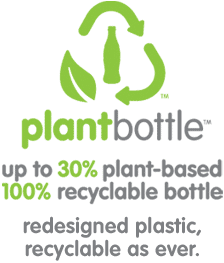Environmentally friendly plastic -
It may sound like a paradox, but a few soft drink companies have already adopted this new type of bottle, and are proudly promoting it.
This new type of plastic bottle is called Plantbottle, contains up to 30% plant-based material. That plant material, which is by-product of sugar cane and corn that have been processed, replaces approximately one-third of the petroleum-based material that traditionally is used to make PET plastic bottles. Plantbottle by the end of 2010 has helped to reduce the use of an amount of oil equivalent to about 3 million gallons of gasoline.
The company’s vision is to develop recyclable plastic bottles made from 100% plant-based waste - turning waste into a resource. Plantbottles are designed to be recycled, rather than biodegradable, since from the view of its developers, it makes better sense from both an environmental and economic perspective to capture the raw material and energy contained in a plastic bottle and use it again and again, instead of losing it as it degrades. By designing the plastic packages for recycling and investing in programs to drive collection and recovery of the used bottles, it is possible use the energy and material in a PlantBottle package over and over again.
A product's carbon footprint typically is thought of as the measure of the amount of carbon dioxide and other greenhouse gases emitted over the full life of that product - from obtaining the raw materials, through the manufacturing process, the use of the product, and finally to the disposal of the product. The footprint may include the recycling and/or the reuse of the product as well. The substitution of renewable plant-based material for fossil-based petroleum resources in making PlantBottle packaging provides for a reduction of potential carbon dioxide emissions associated with end-of-life destruction of the package as compared to a conventional 100% petroleum-based bottle, because some of the carbon atoms in PlantBottle packaging come from a renewable source, sugarcane, and emission of those carbon atoms would be offset by the next sugarcane crop’s use of carbon dioxide in the plant’s photosynthesis process.
Although this information sounds great, one might ask himself/herself: is this new kind of plastic actually better for the environment? Considering the fact that harvesting a plant requires the use of water, energy, fertilizers, pesticides and land, and has significant impact on the ecology, one might doubt this new wonder plastic. However, Plantbottle developers have worked with leading academic, government and NGO partners, and researched around the world to find a source for a more environmentally responsible bottle that wouldn’t harm the ecology or people of the region where it is produced, or compete with food. The only source currently meeting these criteria and approved for use in PlantBottle packaging is sugarcane based ethanol from Brazil.
Brazilian sugarcane ethanol is considered to be an “Advanced Renewable Fuel” by the Environmental Protection Agency (EPA) and is the only first generation biofuel widely recognized by thought leaders globally for its unique environmental and social performance:
Reduced Greenhouse Gas Emissions
- Sugarcane is a renewable, fast-growing plant with a high capacity to absorb carbon dioxide (CO2) from the atmosphere.
- Most sugarcane expansion in Brazil is on degraded pastures that actually generate a carbon credit as the sugarcane captures significant amounts of carbon.
- Brazil’s sugar and ethanol plants generate their own electricity by burning sugarcane byproducts and generating surplus electricity.
- For every unit of fossil energy consumed in the ethanol production cycle, more than eight units of renewable energy are typically produced.
Lower Impact on Biodiversity
- Over 99% of Brazilian sugarcane plantations are located over 2,000km from the Amazon.
- The Brazilian government has established an agro-ecological zoning program limiting the expansion of sugarcane to 7.5% of the Brazilian territory and prohibiting planting sugarcane in over 90% of the country, including the Amazon and other important ecosystems.
- Brazilian sugarcane ethanol is more productive than any alternative in terms of biofuel per hectare of land required.
Effective Cultivation Practices
- Brazilian sugarcane fields require practically no irrigation because rainfall is abundant and reliable.
- Brazilian sugarcane plantations are less dependent on industrial fertilizers, due to the innovative use of organic fertilizers from recycled production residuals.
- Brazilian sugarcane fields have relatively low levels of soil loss thanks to the semi-perennial nature of the sugarcane that is typically replanted every 5-7 years.
- Nearly half of all sugarcane in Brazil is harvested mechanically.
Avoided Food Competition
- While sugarcane production has increased steadily in Brazil, there has been no drop in food production. In addition to sugar, Brazil is a leading exporter of beef, coffee, orange juice, poultry and soybeans.
- Most sugarcane expansion is on degraded pastures.
- Crop rotation systems to promote soil recovery are typically used in Brazil, where 15-20% of the sugarcane crop is removed annually and replaced with other crops like beans, soybean and peanuts, supporting the supplies of these foods in the market.
Plantbottle is currently being used by different soft drink companies such as: Vitamin Water, and Coca-Cola, and may be just the start of a new, environmentally friendly, renewable plastic that will get used for a variety of products.




Comments
Post a Comment
Let your knowledge, ideas, and innovation be heard. Tell us what you think and know about this topic.